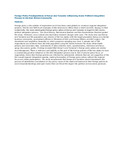Foreign Policy presipositions of Kenya and Tanzania influencing Econo Political integration in the East African Community
Abstract
Foreign policy is the enabler of regionalism and it has been used globally to construct regional integration projects. The EU and NAFTA are examples in the West and in Africa there is SADC and EAC. Basing on their connectivity, the study interrogated foreign policy pillars of Kenya and Tanzania in regard to EAC econo-political integration process. Two-Good theory, Neoclassical Realism and Neo-functionalism theories guided the study. Historical, cross cultural and descriptive research designs were used. The study area was Kenya and Tanzania and the population was citizens of the two states with the target population being cross border business community, government officials in Ministries of EAC and Foreign Affairs, and EAC organs- the Secretariat and Legislative Assembly on which purposive sampling was used. A sample size of 384 respondents was achieved from the total population using the Gomm formula.The study utilised both primary and secondary data. Instruments of data collection were; questionnaires, interviews and focus group discussions guides. Findings revealed that Kenya‟s and Tanzania‟s foreign policy pillars are similar and interspersed. There is reticence and inability on the part of the foreign policies of the two states to have a commanding positive influence on the EAC integration process due to lack of precise policy focus on regionalism, hence their foreign policies are informed by nationalistic interests that are not supportive of the the overall regional integration agenda, making formulation of foreign policy pillars without the regional focus and citizen participation. The study recommends that Kenya and Tanzania should mainstream the process of stakeholder consultation on key policy issues of the state and harmonise their foreign policies to avoid misunderstandings and open rivalry that can thrust the region into political and economic paralysis.
URI
http://jirfp.com/vol-9-no-1-june-2021-abstract-1-jirfphttp://ir-library.mmust.ac.ke:8080/xmlui/handle/123456789/1811
Collections
- Journal Articles [411]

